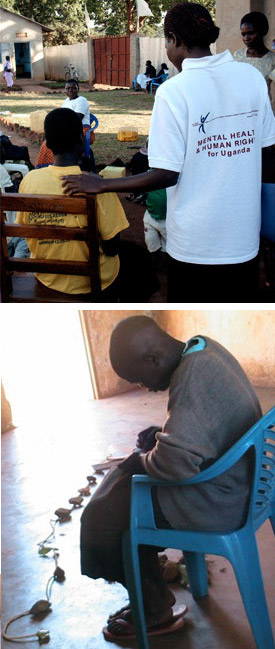vivo decided to build a permanent base in the country in 2004. Local cooperation partners and team members formed vivo Uganda, the independent sister organization of vivo, which is registered with the country’s NGO board. With vivo becoming more and more visible in Uganda, local policy makers and officials requested vivo to not only focus on refugees, but engage in helping the war-affected and displaced population of Northern Uganda.
At that time virtually the entire population of Northern Uganda (about 1.8 Million) was living in Camps for Internally Displaced People (IDP camps) to be safe from attacks and abductions by Joseph Kony’s rebel movement, the Lord’s Resistance Army (LRA). The LRA abducted about 52.000 to 75.000 children and youths and forced them to be fighters, porters, cooks, servants and sexual servants. Moreover they were notorious for brutal massacres, lootings and mutilations of the civilian population. Due to security reasons vivo wasn’t able to start its work in Northern Uganda before 2005, when requests for help came again from local NGOs that were feeling helpless in dealing with former child soldiers presenting with psychological problems. This opened a new chapter of work, since nobody had ever before conducted psychotherapy with traumatized child soldiers. Clinical experts of vivo found that Narrative Exposure Therapy helped to reduce trauma symptoms in this highly war-affected group whose members are regarded as victims and perpetrators of violence at the same time [link to related publication].
Large scale epidemiologic surveys, as well as long term evaluations of treatment success, when treatments of former child soldiers were carried out by trained locals followed and vivo’s projects covered the most affected Northern Ugandan districts. vivo’s engagement was both, urgently needed and highly welcome in Northern Uganda, which convinced vivo to built up a stable base in Gulu, the main town of Northern Uganda in 2007. To date, vivo is working together with more than seven local and international NGOs in and around Gulu as well as with Gulu University. vivo is receiving referrals for trauma treatment, training and supervising staff members of partner NGOs, adjusting treatments to the local context, developing new treatment methods and modules and scientifically monitoring and evaluating the need for and effects of its programs. So far, more than 15 training courses, reaching more than 300 counselors, teachers, social workers, community volunteers and many others have been carried out. More than 4000 in depth mental health screenings were conducted by vivo’s staff and partnering NGOs to find out the scale and nature of psychological suffering and for monitoring and evaluation purposes [link to related publication] . More than 500 beneficiaries have been psychologically treated. Currently, vivo is seeking to understand the consequences of the warfare for the next generation of children, who had the chance to grow up during the ceasefire but who are confronted with the consequences of the traumatic history in their families and communities.
vivo decided to build a permanent base in the country in 2004. Local cooperation partners and team members formed vivo Uganda, the independent sister organization of vivo, which is registered with the country’s NGO board. With vivo becoming more and more visible in Uganda, local policy makers and officials requested vivo to not only focus on refugees, but engage in helping the war-affected and displaced population of Northern Uganda.
At that time virtually the entire population of Northern Uganda (about 1.8 Million) was living in Camps for Internally Displaced People (IDP camps) to be safe from attacks and abductions by Joseph Kony’s rebel movement, the Lord’s Resistance Army (LRA). The LRA abducted about 52.000 to 75.000 children and youths and forced them to be fighters, porters, cooks, servants and sexual servants. Moreover they were notorious for brutal massacres, lootings and mutilations of the civilian population. Due to security reasons vivo wasn’t able to start its work in Northern Uganda before 2005, when requests for help came again from local NGOs that were feeling helpless in dealing with former child soldiers presenting with psychological problems. This opened a new chapter of work, since nobody had ever before conducted psychotherapy with traumatized child soldiers. Clinical experts of vivo found that Narrative Exposure Therapy helped to reduce trauma symptoms in this highly war-affected group whose members are regarded as victims and perpetrators of violence at the same time [link to related publication].
Large scale epidemiologic surveys, as well as long term evaluations of treatment success, when treatments of former child soldiers were carried out by trained locals followed and vivo’s projects covered the most affected Northern Ugandan districts. vivo’s engagement was both, urgently needed and highly welcome in Northern Uganda, which convinced vivo to built up a stable base in Gulu, the main town of Northern Uganda in 2007. To date, vivo is working together with more than seven local and international NGOs in and around Gulu as well as with Gulu University. vivo is receiving referrals for trauma treatment, training and supervising staff members of partner NGOs, adjusting treatments to the local context, developing new treatment methods and modules and scientifically monitoring and evaluating the need for and effects of its programs. So far, more than 15 training courses, reaching more than 300 counselors, teachers, social workers, community volunteers and many others have been carried out. More than 4000 in depth mental health screenings were conducted by vivo’s staff and partnering NGOs to find out the scale and nature of psychological suffering and for monitoring and evaluation purposes [link to related publication] . More than 500 beneficiaries have been psychologically treated. Currently, vivo is seeking to understand the consequences of the warfare for the next generation of children, who had the chance to grow up during the ceasefire but who are confronted with the consequences of the traumatic history in their families and communities.


